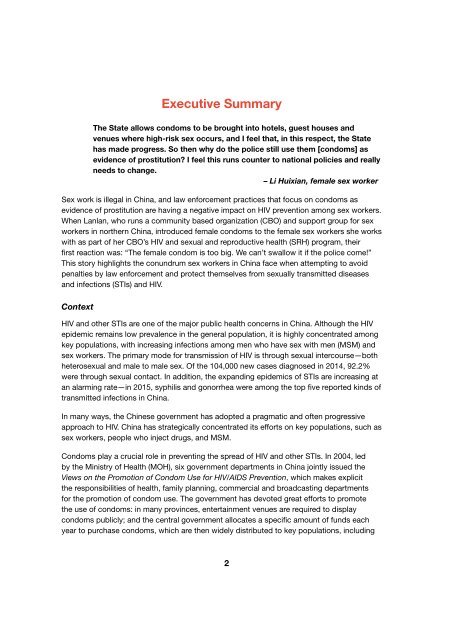THE CONDOM QUANDARY
The-Condom-Quandary-Report
The-Condom-Quandary-Report
Create successful ePaper yourself
Turn your PDF publications into a flip-book with our unique Google optimized e-Paper software.
Executive Summary<br />
The State allows condoms to be brought into hotels, guest houses and<br />
venues where high-risk sex occurs, and I feel that, in this respect, the State<br />
has made progress. So then why do the police still use them [condoms] as<br />
evidence of prostitution? I feel this runs counter to national policies and really<br />
needs to change.<br />
– Li Huixian, female sex worker<br />
Sex work is illegal in China, and law enforcement practices that focus on condoms as<br />
evidence of prostitution are having a negative impact on HIV prevention among sex workers.<br />
When Lanlan, who runs a community based organization (CBO) and support group for sex<br />
workers in northern China, introduced female condoms to the female sex workers she works<br />
with as part of her CBO’s HIV and sexual and reproductive health (SRH) program, their<br />
first reaction was: “The female condom is too big. We can’t swallow it if the police come!”<br />
This story highlights the conundrum sex workers in China face when attempting to avoid<br />
penalties by law enforcement and protect themselves from sexually transmitted diseases<br />
and infections (STIs) and HIV.<br />
Context<br />
HIV and other STIs are one of the major public health concerns in China. Although the HIV<br />
epidemic remains low prevalence in the general population, it is highly concentrated among<br />
key populations, with increasing infections among men who have sex with men (MSM) and<br />
sex workers. The primary mode for transmission of HIV is through sexual intercourse—both<br />
heterosexual and male to male sex. Of the 104,000 new cases diagnosed in 2014, 92.2%<br />
were through sexual contact. In addition, the expanding epidemics of STIs are increasing at<br />
an alarming rate—in 2015, syphilis and gonorrhea were among the top five reported kinds of<br />
transmitted infections in China.<br />
In many ways, the Chinese government has adopted a pragmatic and often progressive<br />
approach to HIV. China has strategically concentrated its efforts on key populations, such as<br />
sex workers, people who inject drugs, and MSM.<br />
Condoms play a crucial role in preventing the spread of HIV and other STIs. In 2004, led<br />
by the Ministry of Health (MOH), six government departments in China jointly issued the<br />
Views on the Promotion of Condom Use for HIV/AIDS Prevention, which makes explicit<br />
the responsibilities of health, family planning, commercial and broadcasting departments<br />
for the promotion of condom use. The government has devoted great efforts to promote<br />
the use of condoms: in many provinces, entertainment venues are required to display<br />
condoms publicly; and the central government allocates a specific amount of funds each<br />
year to purchase condoms, which are then widely distributed to key populations, including<br />
2


